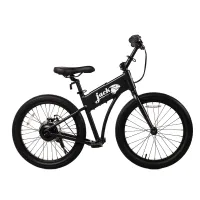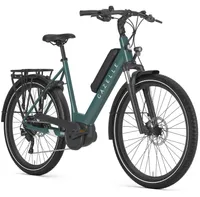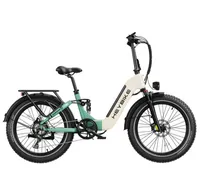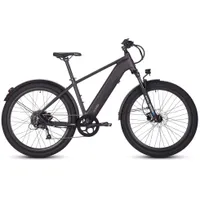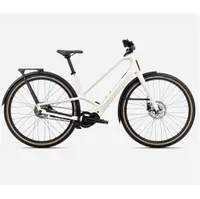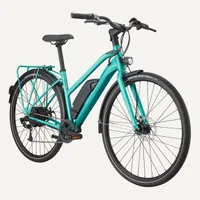The best electric bikes of 2026: expert tested and rated
Our picks for the best electric bikes for riders of all types and budgets, based on dozens of reviews and tests
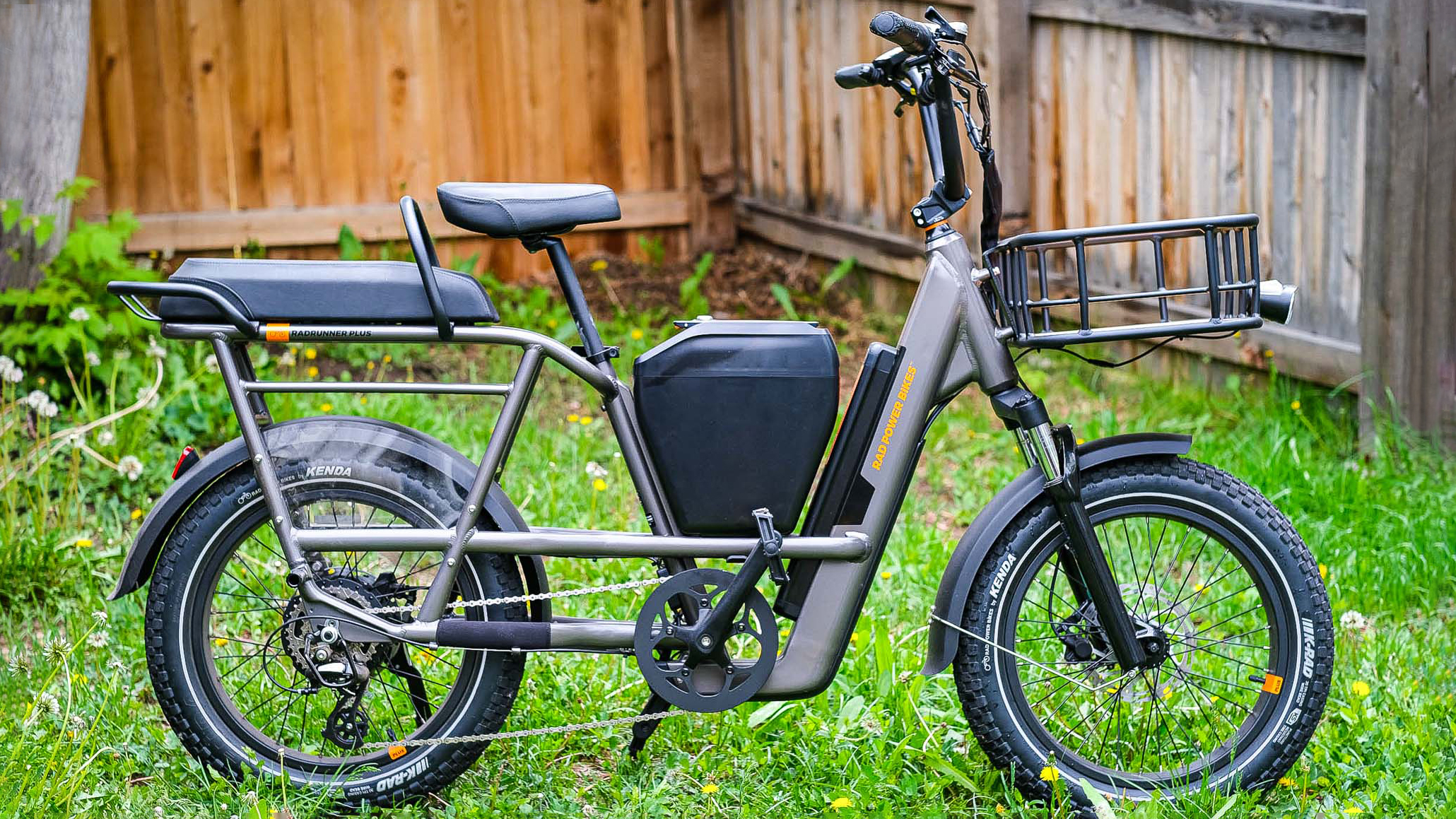
Here at Tom’s Guide our expert editors are committed to bringing you the best news, reviews and guides to help you stay informed and ahead of the curve!
You are now subscribed
Your newsletter sign-up was successful
Want to add more newsletters?

Daily (Mon-Sun)
Tom's Guide Daily
Sign up to get the latest updates on all of your favorite content! From cutting-edge tech news and the hottest streaming buzz to unbeatable deals on the best products and in-depth reviews, we’ve got you covered.

Weekly on Thursday
Tom's AI Guide
Be AI savvy with your weekly newsletter summing up all the biggest AI news you need to know. Plus, analysis from our AI editor and tips on how to use the latest AI tools!

Weekly on Friday
Tom's iGuide
Unlock the vast world of Apple news straight to your inbox. With coverage on everything from exciting product launches to essential software updates, this is your go-to source for the latest updates on all the best Apple content.

Weekly on Monday
Tom's Streaming Guide
Our weekly newsletter is expertly crafted to immerse you in the world of streaming. Stay updated on the latest releases and our top recommendations across your favorite streaming platforms.
Join the club
Get full access to premium articles, exclusive features and a growing list of member rewards.
The best electric bikes are an ideal choice if you want to cut down on the time you spend in the car. From quick daily commutes to short trips into town, these bikes can help you get up to speed and climb slopes with relative ease.
But it can be hard to tell how they really perform until you take a ride. That's why we put the best electric bikes to the test, to help you find the right ebike for your needs, whether you want to head into the office or take a leisurely ride.
After hours on the road, we felt that the Ride1Up Roadster v3 is one of the best electric bikes you can buy right now without breaking the bank. It's more affordable than many, but can still reach 28mph and lasts for 40 miles between charges.
Fortunately, that's not your only option. If you're after a different design, increased range, or alternative features, we've rounded up the best electric bikes you can buy right now. Or, if you're after an option that won't break the bank, consider the best budget electric bikes instead.
Update, December 2025: Just before the end of the year, one of our favorite e-bike brands, Rad Power, filed for bankruptcy. Things hadn't been easy for the company, as reports of battery fires meant it had to issue a recall earlier in year, but the announcement that, unless a buyer is found, Rad Power may be no more, means that we don't recommend the brand's bikes, for now. Hopefully, there'll be a way for Rad Power to, erm, power through, but until then, there are plenty of other fantastic bikes that we've tested for you to check out instead.
Quick list
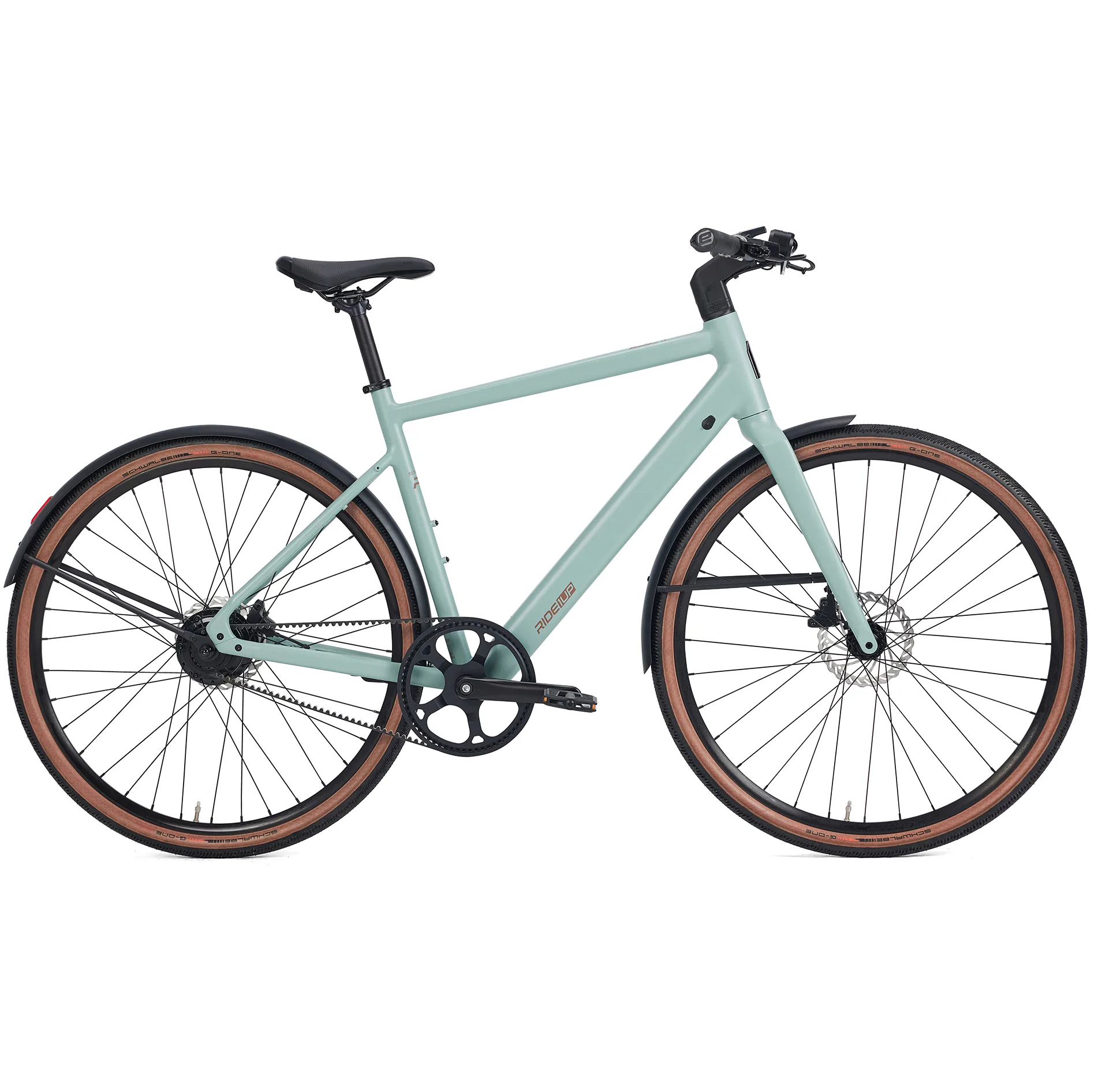
This lightweight ebike lacks some niceties you'll find on more expensive rides — you'll have to provide your own lights and fenders — but it delivers a zippy ride around town at a great price.
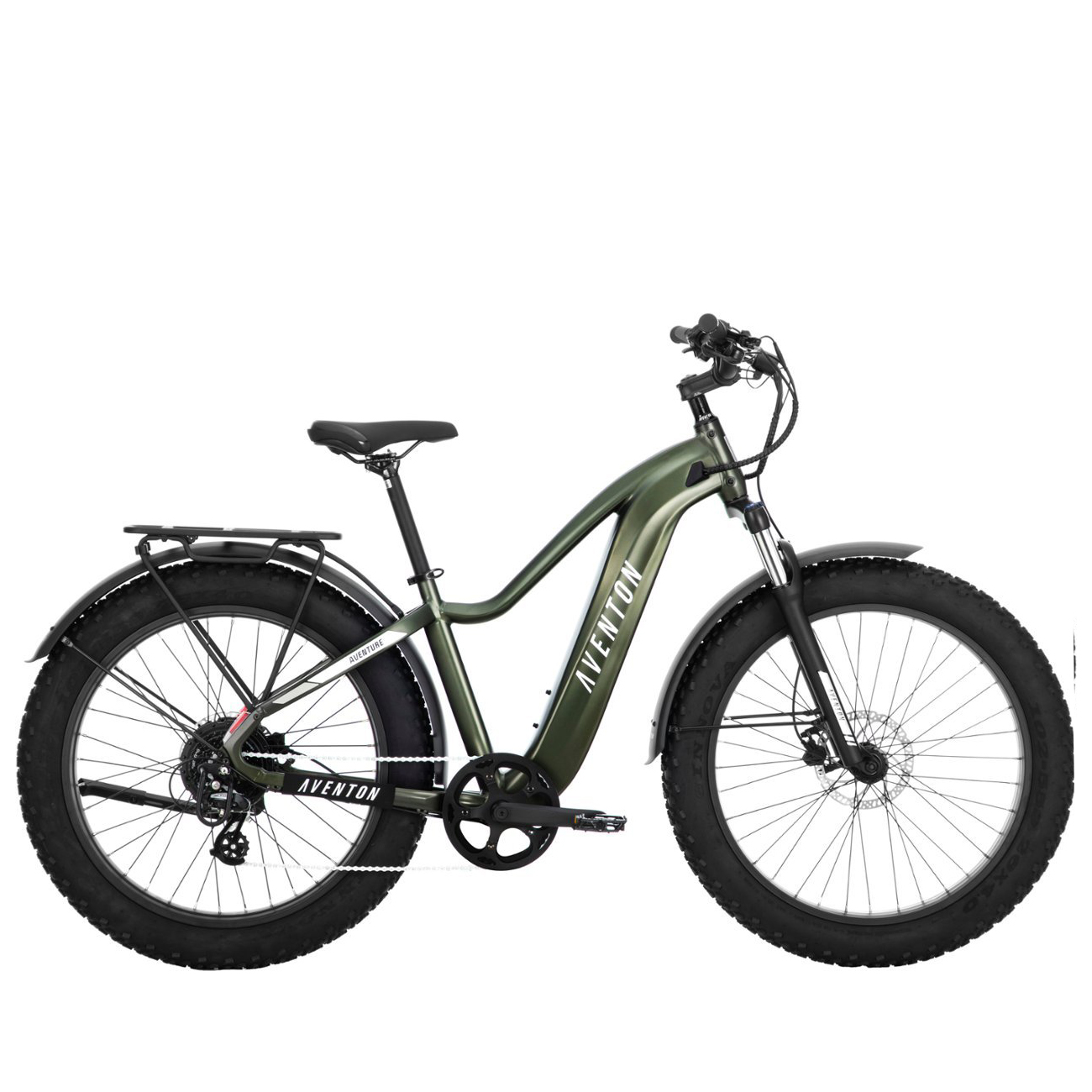
If you're looking for an ebike that can go anywhere, look no further. This bike is responsive, stable in all conditions, including snow, has both lights and turn signals, and even comes with fenders.
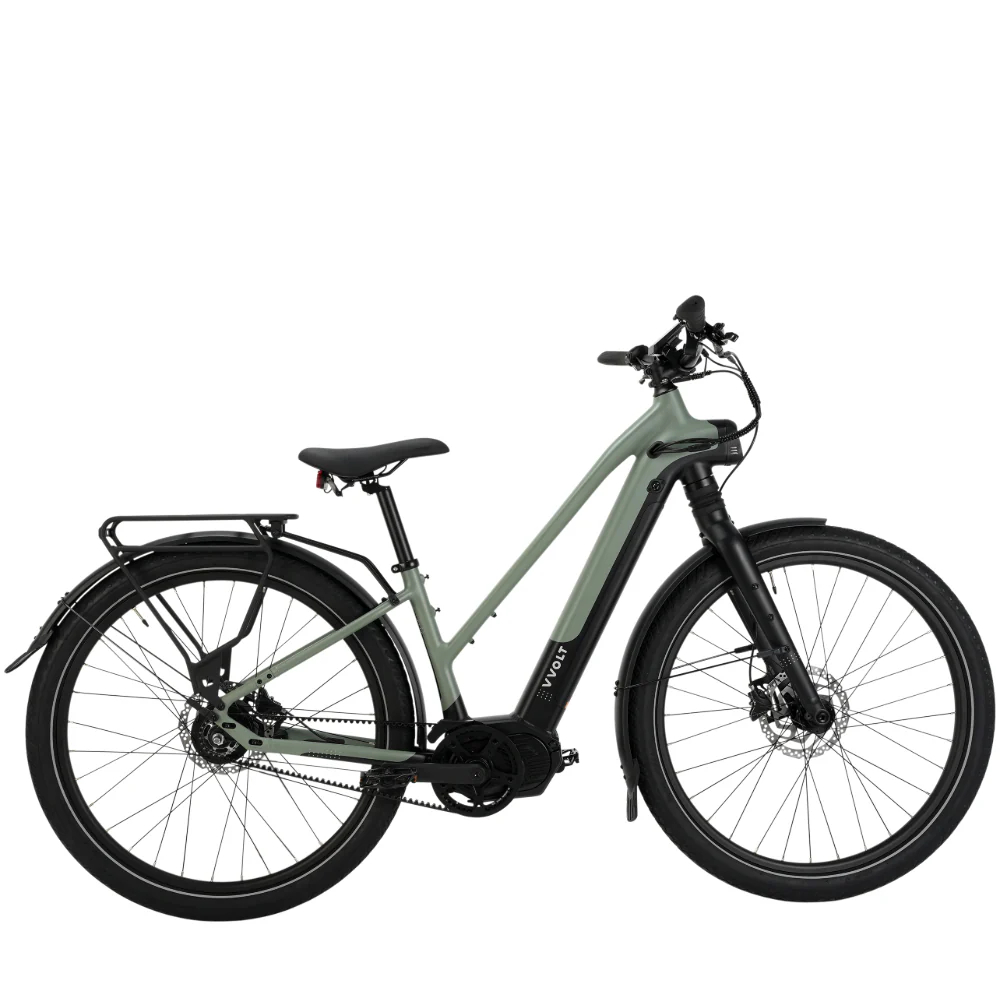
This is such a fun and easy bike to ride, it'd have jumped straight to the top spot on this list if it wasn't for the high price tag. It's versatile, but best-suited to commuters who just want to pedal with as little fuss as possible.
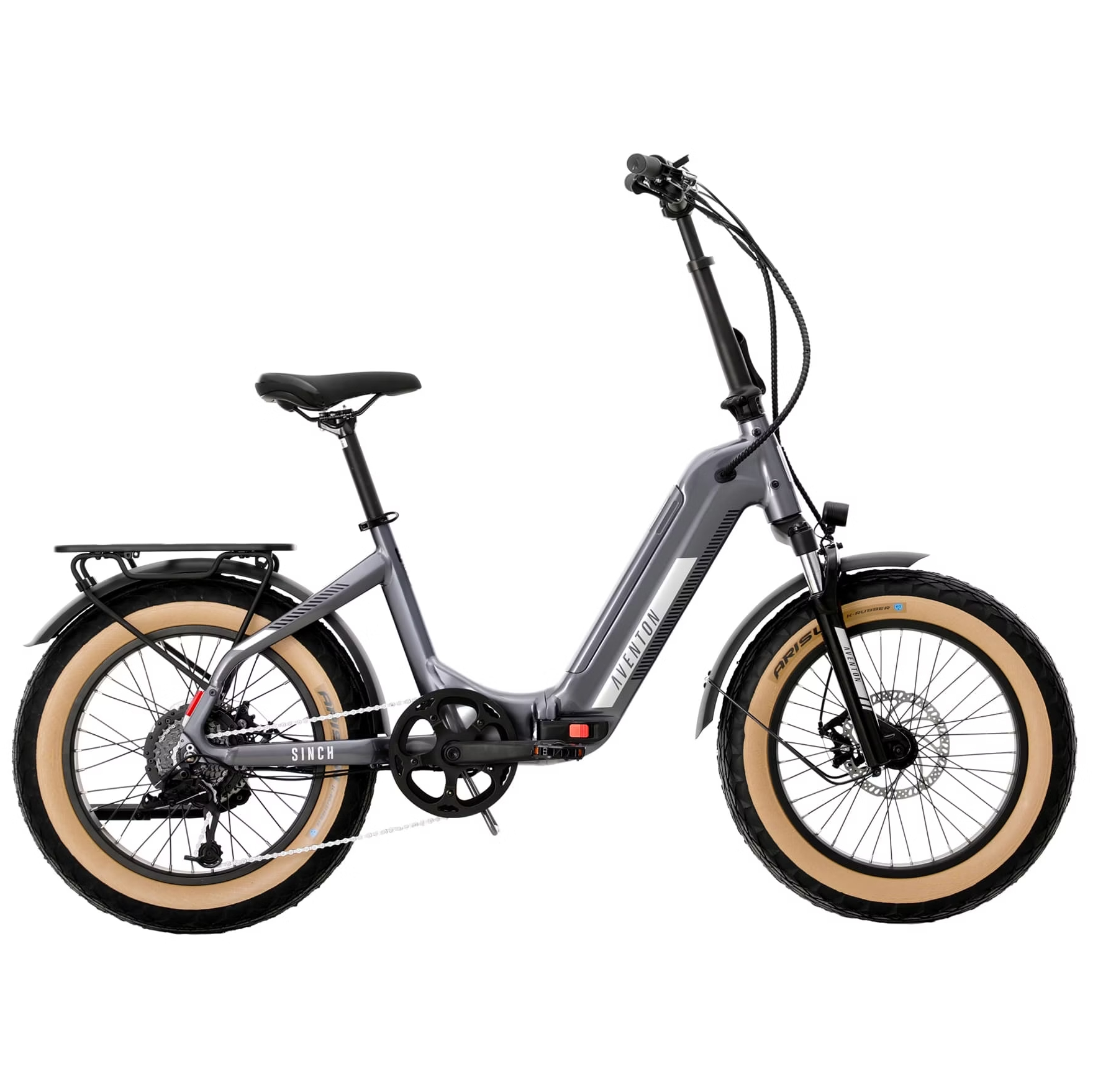
You can quickly fold the Aventon Sinch.2 into a small, book-like package for easy storage, but it's still a capable e-bike for every day use. The suspension is a little soft, but that doesn't undermine the 55-mile range, 20 mph top speed, or comfortable ride.
Read more below
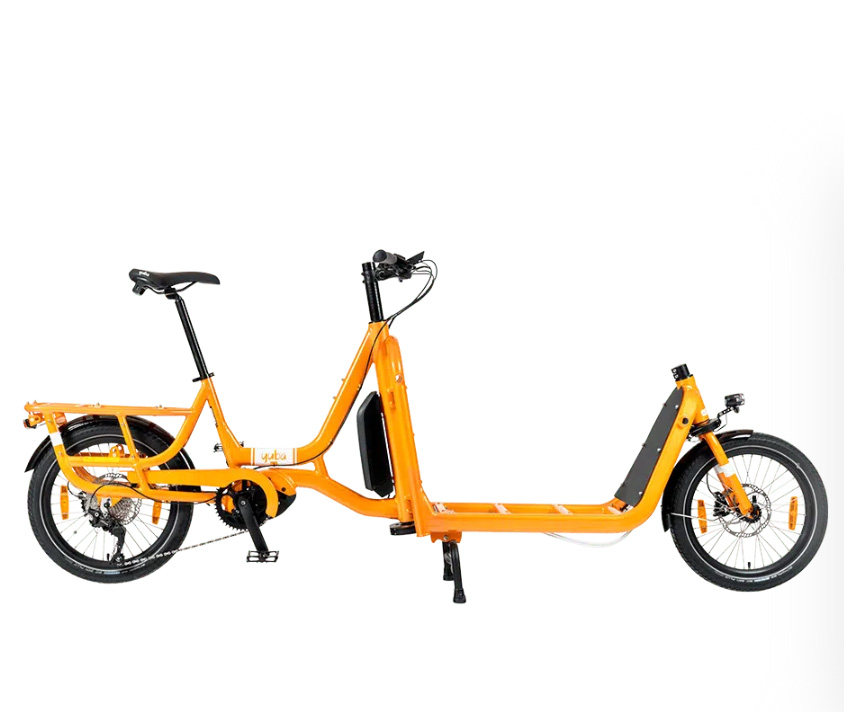
When you need to haul really big loads, the Supercargo CL is your best bet. It has a ton of space, yet is very stable and even fun to ride.
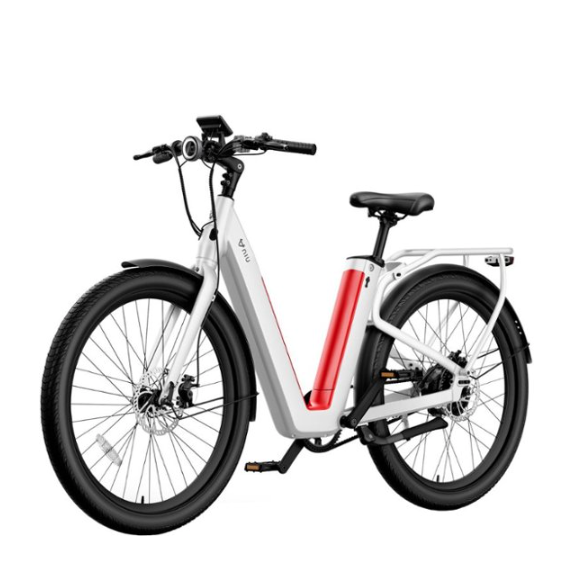
With dual batteries, this bike has the endurance to get you wherever you need to go. And, it's often on sale for a very reasonable price.
The best electric bikes you can buy today
Why you can trust Tom's Guide
Best budget electric bike
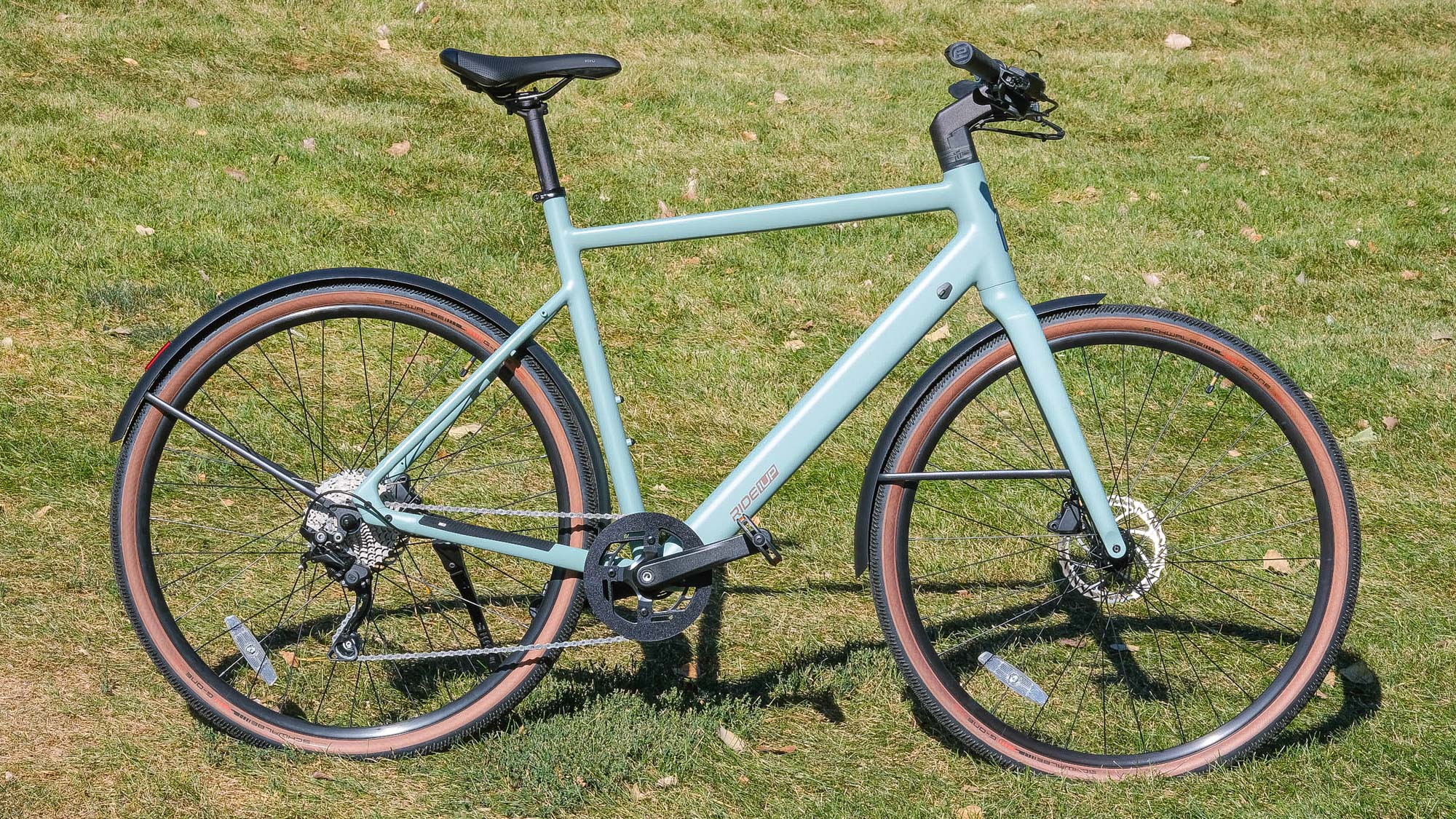
Specifications
Reasons to buy
Reasons to avoid
The Ride1Up Roadster v3 is the follow up to another of our favorite electric bikes, the Roadster v2. On the surface, not much has changed; the design is slightly more polished, it looks (even) more like a regular bike and it's still a versatile commuter bike.
But beneath all this, there have been some technical changes that mean the bike is worth the extra $300 on its predecessor. Its range has increased from 30 to 40 miles, it can reach 28mph in assist (up from 24mph), and the new torque senor makes the assist experience smoother.
After taking it out for regular rides, it reminded us a lot of the V2, but the handling is even more responsive, so it's easier to make quick adjustments on the fly; something that's pretty common while commuting in cities around vehicular traffic. The motor is powerful and gets up to speed quickly, but smoothly and without a sudden jolt.
The Ride1Up Roadster v3 builds on the successes of the past iteration to easily claim its position as one of the best electric bikes, but we did find one potential downside. The battery drained faster than expected on our test rides, dropping 20% in just five miles when on the highest assist level.
- Read our full Ride1Up Roadster V3 review
Best fat tire electric bike
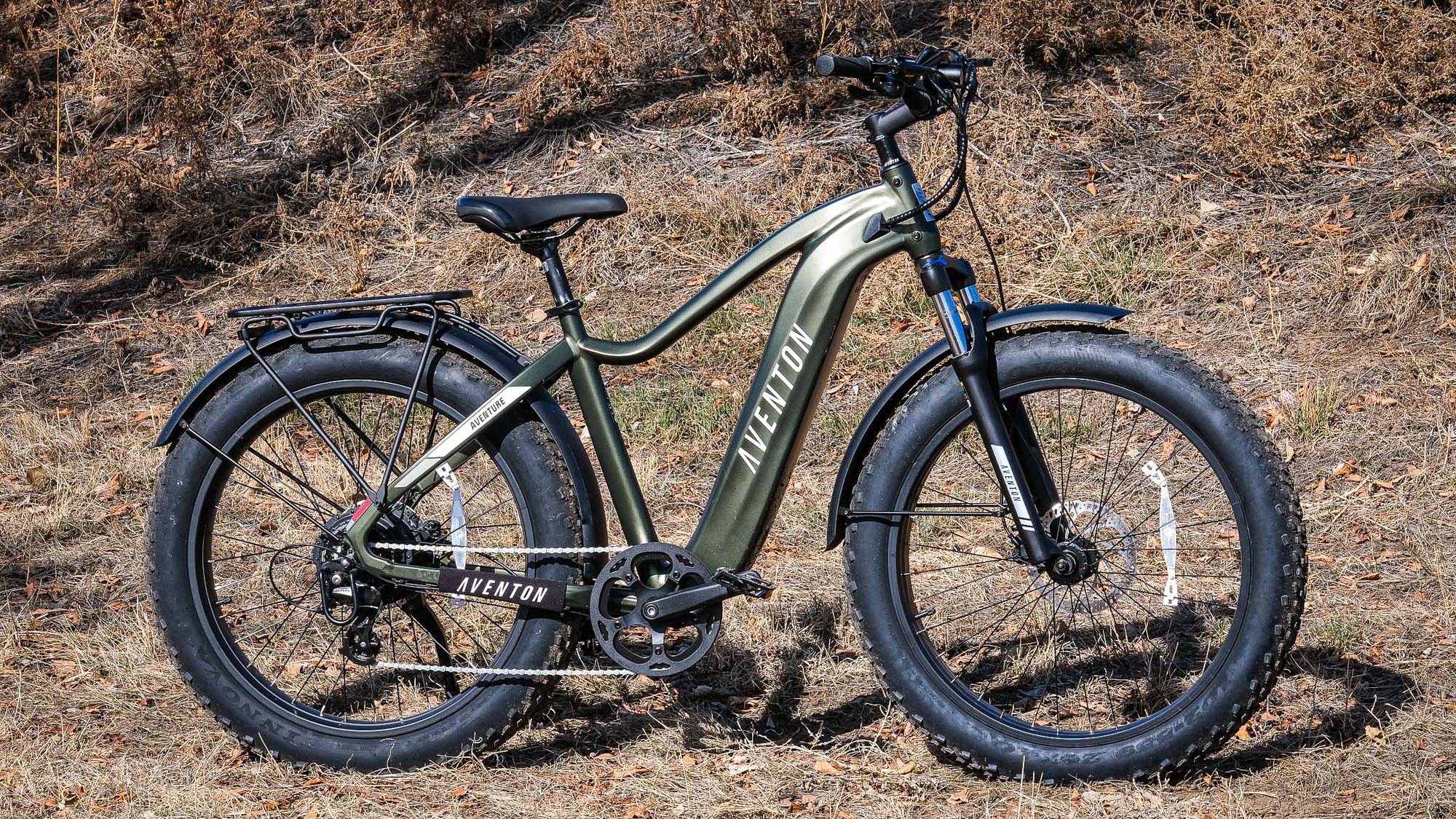
Specifications
Reasons to buy
Reasons to avoid
If you're looking for a fat-tire electric bike that's less than $2,000, the Aventon Aventure.2 is hard to beat. It's as good off-road as it is on pavement, has a beefy battery and a clear color display, as well as fenders that'll save your clothes from getting too muddy. Other niceties include a brake-activated rear light and turn signals.
The Aventure.2 has both pedal-assist and throttle modes, and the battery and wires are neatly integrated into the frame. What's more, the battery can be removed for charging. The battery lasted nearly the advertised 60 miles on a charge, but, as with other ebikes, we drained it much faster when we relied on the throttle.
While not as capable as a dedicated mountain bike, the Aventure.2 was able to get us up and over hilly terrain, and its torque sensor was quick to translate our pedaling into power.
Our only real critiques were the bike's 77-pound weight and its front suspension fork, which felt unnecessary. Otherwise, it's an excellent bike for the price.
- Read our full Aventon Aventure.2 review
Best electric bike for commuters
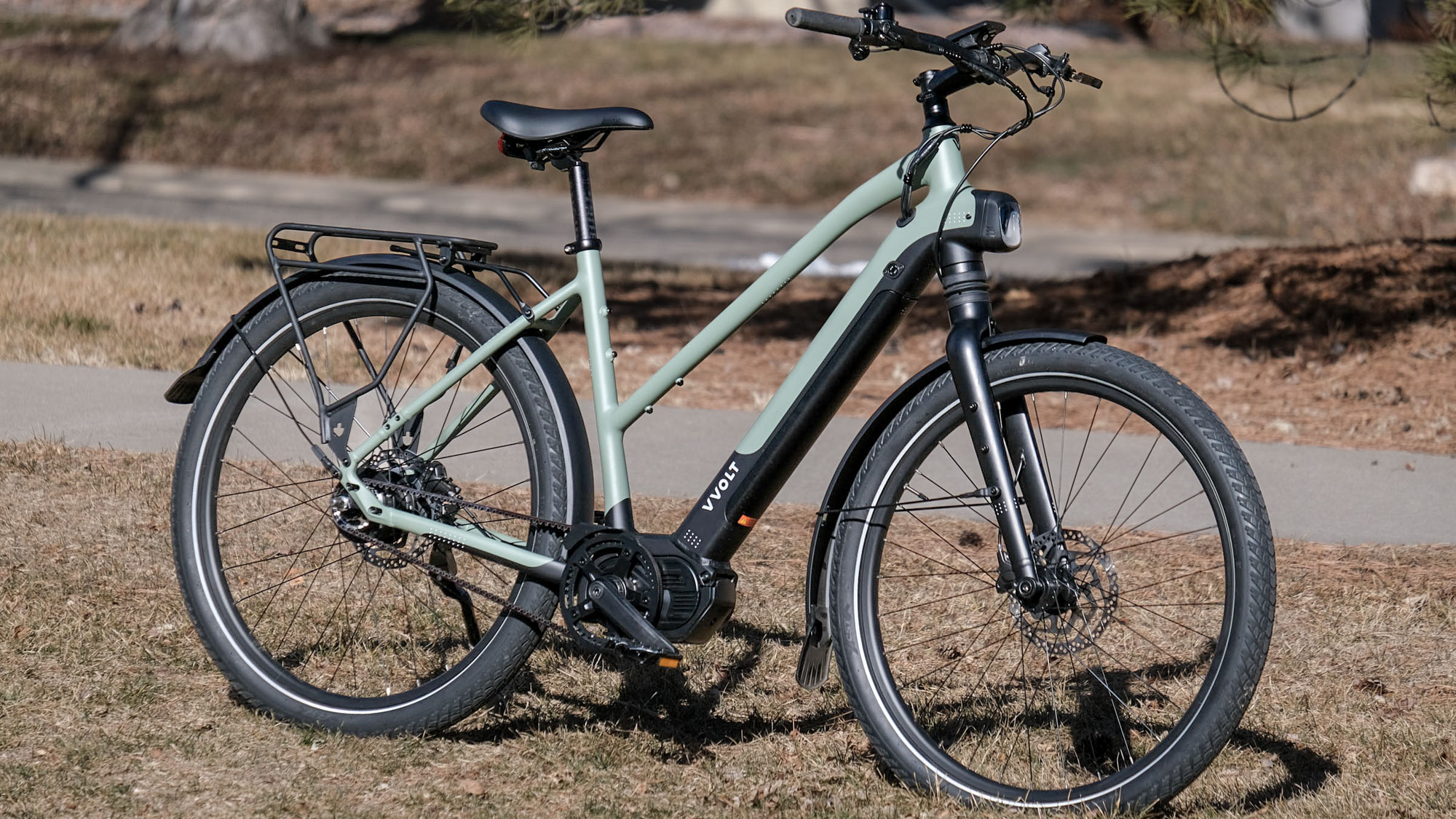
Specifications
Reasons to buy
Reasons to avoid
If it weren't for the price, the Vvolt Centauri II would easily be the best electric bike out there. We were impressed with how effortless it was to ride, and fun! It's rare to find a commuter bike that isn't just functional, but that you get excited to take out.
Of course, you'd hope it would be for over $3,000, but if your budget extends, it's a great value option, packing in pretty much everything you could ever want from a commuter electric bike, including a fairly sizeable 60-mile range.
That sounds like a lot, especially compared to the other bikes in this list which typically reach 50 miles, but it's important to remember than this varies depending on how you ride the bike and in what conditions. During testing, we got around 37 miles, which is still a good figure, but some way off Vvolt's listing.
It is an almost flawless e-bike, but if we're being picky (which is fair at this price), then the boost button could be a bit faster to kick it. It typically takes four seconds, which isn't super helpful if you're looking for extra assist from a dead start on a steep hill, for example.
But in pretty much every other way, the Centauri II is an absolute joy to ride. The front suspension keeps things smooth and deftly reduces the impact of bumps, while the rear suspension flexes enough so that you don't get massive shocks as you cycle over cracks and potholes.
Plus, the autoshift keeps the ride pretty straightforward, and you barely notice as it moves you up and down gears based on your conditions. And the assist it really effective, especially on flat roads, where you can maintain a high speed with very little effort.
- Read our full Vvolt Centauri II review
Best folding electric bike
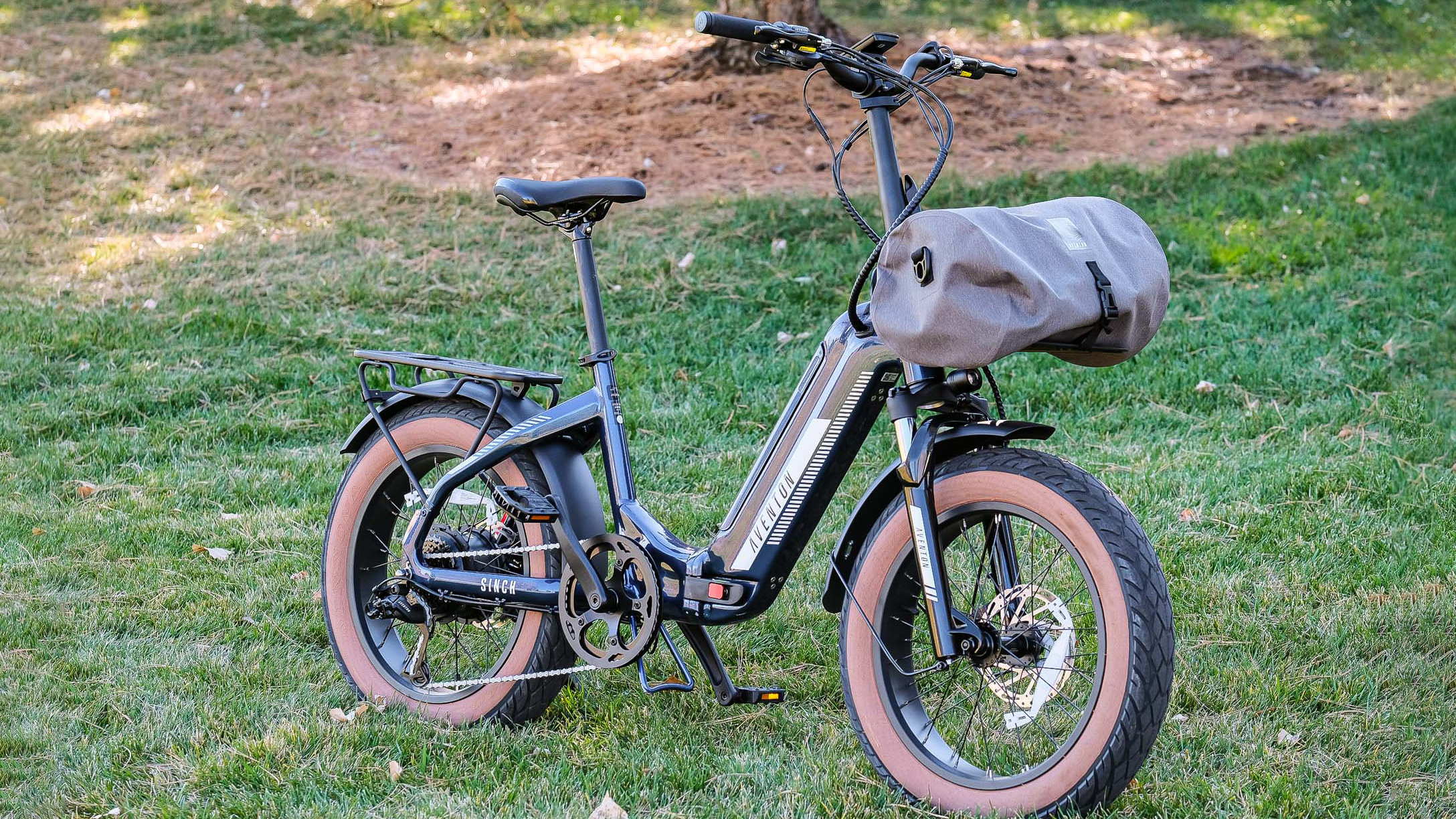
Specifications
Reasons to buy
Reasons to avoid
Most electric bikes are hefty items, designed to help you out when you're on the road. But they're also heavy and difficult to store between rides. The Aventon Sinch.2 is different, as it has a foldable frame, making it ideal for commutes or tight spaces.
There are compromises — the motor isn't as powerful as some in this list, and the battery won't get you as far — but it can reach 20mph with assistance, and the 20-inch wheels are equipped with 4-inch tires, so it can handle most everyday terrains.
We found it pretty easy to ride around on the bike, and it'd make a great option if you need to head to the office, commute to college, or take a quick trip into town. And the folding mechanism is straightforward too.
A quick pull on two levers releases handlebars and the link between the front and rear of the bike, allowing you to fold it in on itself like a book, making the two wheels line up into a fairly small 20 x 24 x 32-inch package.
It's the best folding electric bike if you need to save on space, and our only niggle was that the suspension fork was a bit too soft. However, if you find the same, you can easy switch it out for a more rigid fork as required.
- Read our full Aventon Sinch.2 review
Best electric bike for front storage
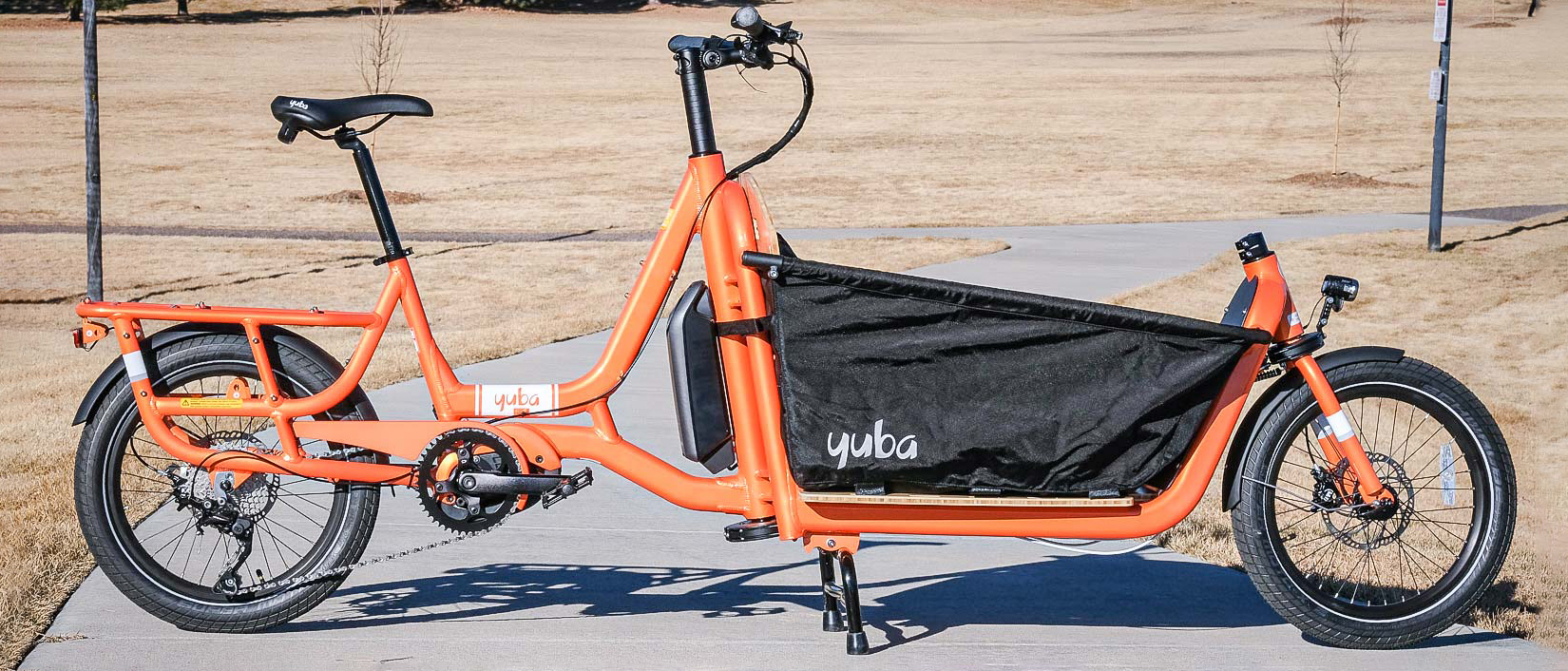
Specifications
Reasons to buy
Reasons to avoid
The Yuba Supercargo CL can haul an astounding 500 pounds, making it one of the heftiest electric cargo bikes in its class. Yet, it offers a surprisingly stable ride, thanks to its low center of gravity. Its cargo area is very customizable, letting you convert it from a place to carry groceries to a space to tote your tots to soccer practice.
Magna hydraulic brakes and a Bosch mid-drive motor were very responsive, though the relatively small 20-inch tires and lack of suspension did make bumps feel a bit jarring. The Supercargo CL starts at around $6,000, but is incredibly customizable; you can select from a range of accessories to adapt the cargo area to suit your needs.
- Read our full Yuba Supercargo CL review
Best electric bike for range
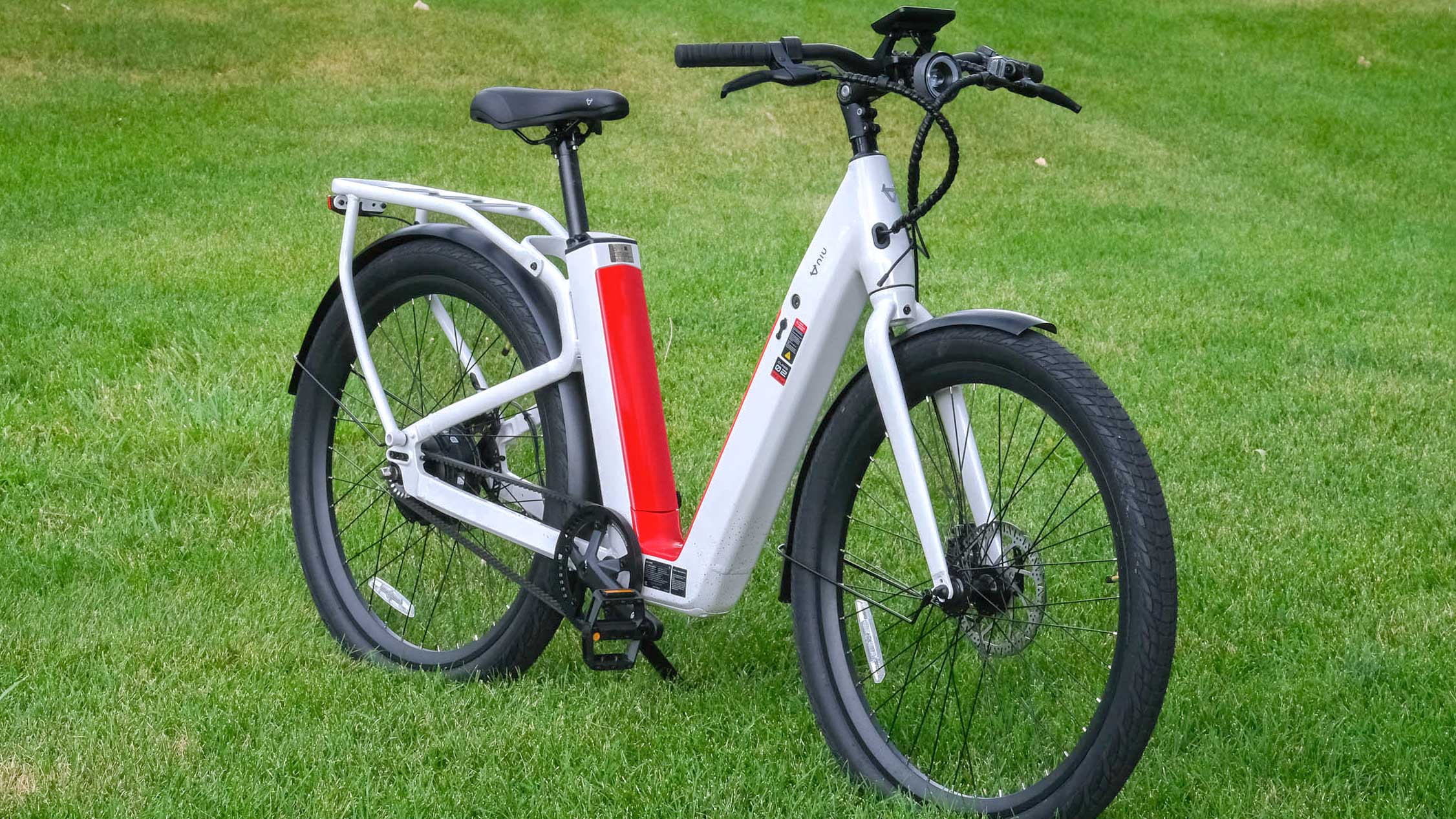
Specifications
Reasons to buy
Reasons to avoid
With its dual batteries, the NIU BQi-C3 Pro is the best electric bike for those who have range anxiety, as it can give you up to 90 miles of range before you need to recharge. And, that's no boast — based on our testing, we found that 90-mile estimate to be pretty accurate, too.
But range isn't the only thing we liked about the BQi-C3 Pro: It has mechanical disc brakes, front and rear lights, and a rear rack so you can carry things wherever you plan to go.
A carbon belt drive is another nice-to-have feature, as it's quiet and easier to maintain than a traditional metal chain. Its step-through design also makes the bike easy to use for riders of all sizes; we tried it with both a 5' 11" rider and a 5' 3" rider, and both found it comfortable.
Our only real complaint with the BQi-C3 Pro is that at 70.5 pounds, it's one of the heaviest electric bikes we've tested that's not a cargo bike, so this is not a model to buy if you have to go up any stairs. Still, the bike's 500W motor was more than powerful enough to get its bulk moving with ease.
- Read our full NIU BQi-C3 Pro review
Also tested
We're continually reviewing and testing e-bikes so that we can recommend the best electric bikes for a range of situations. However, these are some that don't quite make the cut that are still great options if you're after more choice.
This micro e-bike is a lot of fun to ride, and successfully navigated us around New York City during commuting hours. But given its diminutive stature, lack of built-in lights and 10ish-mile range, there are more versatile bikes at this price.
Read our full Jackrabbit OG 2 review
It's comfortable and easy to ride, but we just didn't find the assist was powerful enough to recommend. Plus, it weighs a pretty hefty 50 pounds, and costs over $2,000; there are better electric bikes around for the money.
Read our full Gazelle Medeo T9 City review
The design pretty impressed us, and the folding mechanism is easy to use and neatly packages the bike for storage, but the electronics were buggy and the assist lag made hill and stationary starts more difficult than they should be.
Read our full Heybike Horizon review
Like the Ride1Up Roadster, the LMT'd V2 takes a no-frills approach to the commuter ebike. We enjoyed riding it, but think that the Charge Bikes City is still the better option for commuters, even if it is $200 more.
Read our full Ride1Up LMT'd V2 review
The Diem is another city-focused commuter bike, designed to help you navigate busy urban roads. We enjoyed our rides, but felt the handlebars were too wide to navigate tight traffic or narrow lines without hitting other vehicles.
Read our full Orbea Diem review
Before the Vvolt Centauri II came along, we ranked the Charge City as the best electric bike for commuting. It's quite a lot cheaper than the Vvolt model, but it just isn't quite as fun (or easy) to ride and you can more readily spot the design compromises Charge made to keep the cost down.
Read our full Charge Bikes City review
What to look for when buying an electric bike
Pedal-assist or throttle?
All electric bikes have what's called pedal-assist; you start pedaling, and the bike's motor kicks in to make your ride a little easier. But you need to put in at least some work: you won't go anywhere unless you pedal. Most electric bikes will also let you set the level of assistance, so you can decide how hard you want to pedal.
However, some electric bikes will also have a throttle. Press a button or push a lever, and the bike will do all the work for you — no pedaling needed! Using a throttle will quickly eat up the battery life on the bike, so you'll get far less of a range if you don't want to pedal at all.
Motor type
Less expensive electric bikes traditionally use a rear hub motor. Mid-drive motors located in the center pedal crank shaft tend to be more expensive but offer better overall balance and smoother shifting.
Motors are also rated based on their power, measured in Watts. Typically, the least powerful motor will be 250 Watts, but unless you're a very large person or planning to go up really steep hills, the motor size shouldn’t be a major determining factor for your purchase. More important, there is no industry standard for measuring Watts (is it continuous or peak and if peak, for how long?). So in general, a motor’s Watt rating isn’t a reliable indication of power.
Battery size
Consider where you live. If you're in San Francisco you're going to want more help than if you're cruising around Austin. Watt hours (Wh) is the most important figure for comparison—it takes into account battery output and battery life to give you a better sense of available power. Higher Wh translates into more range.
Many electric bike makers will also include an estimated range (usually about 40 miles) that you can get off a single charge. You should take this figure with a large grain of salt, as that number is usually determined under ideal circumstances: A fairly lightweight person riding on flat terrain with no wind, and at the perfect ambient temperature for the battery. Range is also dependent on the level of power assist being used, whether full-throttle has been applied and for how long, and your average speed. As they say, your mileage may vary.
Removable or built-in battery?
Most bike batteries will handle rides of about 40 miles and need to be plugged in for at least a couple of hours to get to 80 percent of capacity. So if you have a more demanding commute, consider a model that lets you swap out the battery rather than a bike with an integrated battery.
Also, if you live in a place where you can't bring your bike inside or get close to a wall outlet (such as if you live in a walk-up apartment), definitely look for a bike with a removable battery. It will make your life a lot easier.
Step-over or Step-through?
Many electric bike makers will offer their bikes in two configurations: Step-over (which has a top bar that runs parallel to the ground) and Step-through (the bar is angled downwards). Once upon a time, step-through models were traditionally thought of as women's bikes, but that perception is changing. It's generally easier to get on and off a step-through bike, as you don't have to lift your leg over a bar.
Safety features
If you're planning to ride your electric bike in traffic or in low-light conditions (such as dawn and dusk), it's worth looking for an electric bike with built-in head and taillights. While increasingly common, it's not a standard feature on all models.
How we test electric bikes
To help you find the best electric bike for your needs, we put each model through its paces across long rides, commutes, and leisurely cycles. Most of the time, we ride the ebikes on roads, but will occasionally handle rougher terrain if the bike is designed to withstand these conditions. If a particular model is designed for a certain type of use such as city commuting we make sure to test it in a proper city environment, or if it's made for adventure, we'll take it to the trails.
But before taking them outside, many electric bikes need assembly, so we put them together, follow the instructions, and assess how practical and easy it is to do. Then, we take them for an initial ride, looking at the responsiveness of the motor, power delivery lag times, and the general comfort of the bike.
Then we try them out in a range of conditions (bright, rainy, windy, at night) to see how they handle different weathers, and if the built-in lights are powerful enough to let you see oncoming obstacles. And, alongside this, we test other safety features like bells and horns.
Many of these tests apply to regular bicycles, but one of the most important factors for any ebike is the range. We put the manufacturer's estimates to the test, to make sure that you don't get caught out with a flat battery half-way through your ride or while at the office, and the ease and speed or recharging.
Since most electric bikes come with an app to monitor the battery capacity and adjust several settings, including some locking or safety features, we also download the app and evaluate its ease of use, reliability, and the usefulness of its features.
FAQs
What are the different types of electric bike?
Generally speaking, electric bikes fall into the same categories as non-electric bikes. Here's a quick summary of some of the kinds of electric bikes you'll find.
Road bike: These are meant solely for riding on roads, and are designed for speed. They will have thinner tires and curved handlebars, so that the rider will be crouched forward. Higher-end models may also be made out of carbon fiber, so as to make the bike as light as possible.
Mountain bike: Designed for off-road use, mountain bikes will have thick, knobby tires, full suspension, and a burlier frame to better absorb bumps and jumps.
Fat tire bikes: Similar to mountain bikes, fat tire bikes are meant to be ridden off-road, usually on very soft ground, such as mud, sand, and snow. As their name suggests, these bikes have very wide tires — as much as four inches — which helps keep a grip on unsteadier terrain.
City/Commuter bike: Made for urban dwellers who need to get around town, a commuter bike will have tires that are somewhere in between a road and a mountain bike. Generally, the bikes will be configured so that the rider's back is vertical when seated, which gives them a better view of their surroundings.
Cargo bike: These bikes are made for carrying heavy loads, and will have a cargo area either in the front or rear of the bike. Because of the payload area, these bikes often tend to me much longer and heavier — and more expensive — than a typical bike.
What is a good speed for an electric bike?
In the U.S., electric bikes are limited to 20 miles per hour; that is, they can only provide you with power — either through pedal-assist or with a throttle — until the bike hits 20mph. While you can easily go faster than 20mph on an electric bike, the rest of that power will have to be provided by you — or gravity.
How much does an electric bike cost?
Much like regular road bikes, the price of an electric bike can vary dramatically, so there should be an option to suit your budget and requirements. You can pick up some of the best budget electric bikes for around $1,000, but the trade off is often a less powerful motor, fewer smart features, or a smaller battery.
But most electric bikes retail for between $1,500 and $2,500, and you can customize a lot of them to adjust the battery capacity (or buy an additional one). The best folding electric bikes fall in this price bracket, but also have restrictions on range of assistive speeds due to the foldable design.
If you have the budget for a premium electric bike or something more specialized like a cargo bike for transporting goods and groceries, these are generally more than $3,000 and can run up to about $8,000 for some models.
What are the regulations for ebikes?
There has been a lot of confusion about ebikes (pedal assist versus throttle bikes) and where you can legally ride them. Some municipalities have banned ebikes from bicycle paths, for example.
Many places classify ebikes depending on whether they can go full throttle and have a maximum speed of 20 or 28 mph. There are three official classifications:
Class 1: Ebikes that only assist while you pedal, with a top speed of 20 mph.
Class 2: Ebikes with a throttle that don't require you to pedal but have a top speed of 20 mph.
Class 3: Ebikes that only assist while you pedal, with a top speed of 28 mph.
So check your local regulations before you buy. And always wear a helmet.
Do I need insurance for an electric bike?
In a word, yes. The best electric bikes don't come cheap, so insurance is always a good idea. There's plenty of different policies and insurers to choose from, so it's a good idea to shop around and see what's out there. You'll also want to think about your different needs, as often things like theft and accidental damage will be extras. If you're using your ebike regularly, insurance could save you a lot of money should anything happen to your bike.
More from Tom's Guide
Buying guides
Get instant access to breaking news, the hottest reviews, great deals and helpful tips.

Michael A. Prospero is the U.S. Editor-in-Chief for Tom’s Guide. He oversees all evergreen content and oversees the Homes, Smart Home, and Fitness/Wearables categories for the site. In his spare time, he also tests out the latest drones, electric scooters, and smart home gadgets, such as video doorbells. Before his tenure at Tom's Guide, he was the Reviews Editor for Laptop Magazine, a reporter at Fast Company, the Times of Trenton, and, many eons back, an intern at George magazine. He received his undergraduate degree from Boston College, where he worked on the campus newspaper The Heights, and then attended the Columbia University school of Journalism. When he’s not testing out the latest running watch, electric scooter, or skiing or training for a marathon, he’s probably using the latest sous vide machine, smoker, or pizza oven, to the delight — or chagrin — of his family.
- James FrewBuying Guide Editor
 Club Benefits
Club Benefits










